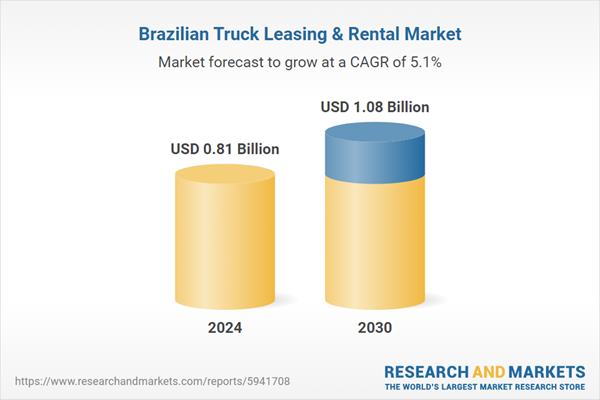Speak directly to the analyst to clarify any post sales queries you may have.
10% Free customizationThis report comes with 10% free customization, enabling you to add data that meets your specific business needs.
As companies strive to optimize their supply chain operations and meet the growing demands of consumers, the need for reliable and flexible truck leasing and rental services becomes crucial. By offering a wide range of vehicles, flexible rental options, and value-added services, companies operating in this market can cater to the diverse needs of businesses across various industries. With the continuous advancements in technology and the increasing focus on sustainability, the truck leasing and rental market in Brazil is poised to play a vital role in shaping the future of the transportation industry in the region. According to ANFAVEA (Brazilian Motor Vehicle Manufacturers Association), truck registrations for rental purposes accounted for 10% of new sales in 2023, compared with 6.5% in 2022, and are projected to reach 14-15% in 2024.
Key Market Drivers
Economic Growth and Infrastructure Development
Economic growth in Brazil has been a significant driver of the truck leasing and rental market. As the country experiences economic expansion, various sectors, including manufacturing, agriculture, and e-commerce, rely heavily on road transportation for the movement of goods. According to IBGE (Brazilian Institute of Geography and Statistics), road freight accounts for over 60% of cargo transport in Brazil, making trucks a vital logistics backbone and influencing rental demand.This increased economic activity fuels demand for a flexible and scalable truck fleet, making leasing and rental options more attractive for businesses. Furthermore, infrastructure development initiatives, such as the expansion and improvement of highways, ports, and logistics hubs, require reliable and diverse truck fleets to support construction and transportation needs. Truck leasing and rental services offer companies the agility to adapt to the dynamic economic landscape and tap into new opportunities without the burden of upfront capital investments.
Key Market Challenges
Infrastructure and Road Conditions
Brazil's vast and diverse geography, while offering opportunities for the transportation industry, also presents significant challenges. The quality of the road infrastructure varies widely across the country, with well-developed highways in some regions and inadequate or poorly maintained roads in others. This inconsistency can lead to increased maintenance costs, vehicle wear and tear, and even delays in deliveries. Truck leasing and rental companies may have to invest in more robust and versatile vehicles to navigate Brazil's diverse road conditions, which can be costly. The state of infrastructure also affects transportation efficiency and safety, which are key considerations for businesses looking to lease or rent trucks.Key Market Trends
Growth in E-commerce and Last-Mile Delivery
The exponential growth of e-commerce in Brazil is driving a significant trend in the Truck Leasing & Rental Market. With consumers increasingly turning to online shopping, there is a growing demand for efficient last-mile delivery solutions. E-commerce companies are increasingly relying on leased and rented trucks to meet this surge in demand, particularly during peak shopping seasons. These vehicles are often equipped with advanced telematics systems, ensuring the real-time tracking and monitoring of deliveries. The trend of e-commerce is likely to continue, and this sector will play a pivotal role in shaping the future of truck leasing and rental services in Brazil.Key Market Players
- Enterprise Holdings, Inc.
- Penske Truck Leasing Co.
- Idealease, Inc.
- Rush Enterprises, Inc.
- Mendon Trucks Leasing and Rental
- PACCAR Leasing Company
- Ryder System, Inc.
- Wyatt Leasing, LLC
Report Scope:
In this report, Brazil Truck Leasing & Rental Market has been segmented into the following categories, in addition to the industry trends which have also been detailed below:Brazil Truck Leasing & Rental Market, By Truck Type:
- Light Duty
- Medium duty
- Heavy duty
Brazil Truck Leasing & Rental Market, By Type:
- Lease
- Rental
Brazil Truck Leasing & Rental Market, By Lease Type:
- Financial
- Operational
- Third Party
Brazil Truck Leasing & Rental Market, By End User:
- Oil & Gas
- FMCG
- E-Commerce
- Mining
- Construction
- Others
Brazil Truck Leasing & Rental Market, By Region:
- North
- Northeast
- Central-West
- Southeast
- South
Competitive Landscape
Company Profiles: Detailed analysis of the major companies present in Brazil Truck Leasing & Rental Market.Available Customizations:
With the given market data, the publisher offers customizations according to a company's specific needs. The following customization options are available for the report.Company Information
- Detailed analysis and profiling of additional market players (up to five).
This product will be delivered within 1-3 business days.
Table of Contents
Companies Mentioned
- Enterprise Holdings, Inc.
- Penske Truck Leasing Co.
- Idealease, Inc.
- Rush Enterprises, Inc.
- Mendon Trucks Leasing and Rental
- PACCAR Leasing Company
- Ryder System, Inc.
- Wyatt Leasing, LLC
Table Information
| Report Attribute | Details |
|---|---|
| No. of Pages | 70 |
| Published | September 2025 |
| Forecast Period | 2024 - 2030 |
| Estimated Market Value ( USD | $ 0.81 Billion |
| Forecasted Market Value ( USD | $ 1.08 Billion |
| Compound Annual Growth Rate | 5.1% |
| Regions Covered | Brazil |
| No. of Companies Mentioned | 8 |









